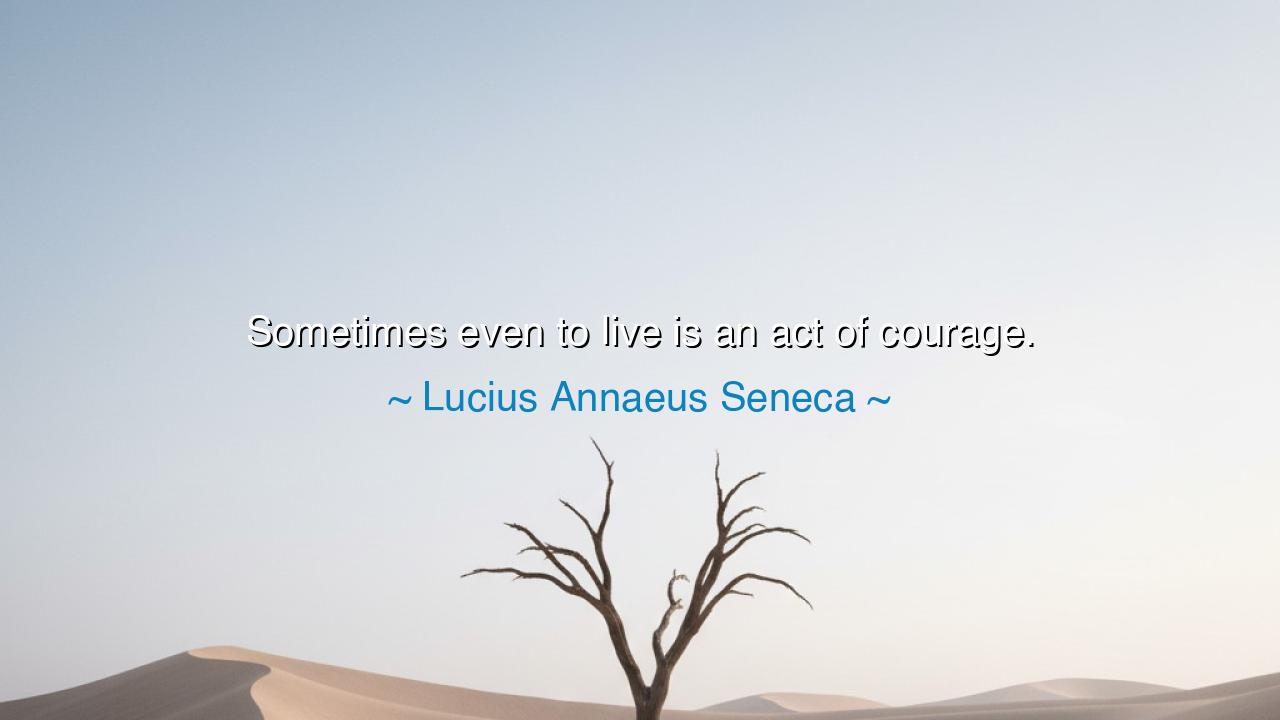
Sometimes even to live is an act of courage.






The Roman philosopher Lucius Annaeus Seneca, master of the Stoic way, once wrote: “Sometimes even to live is an act of courage.” These words, simple yet vast as the sea, carry within them the weight of all human suffering and the glory of endurance. In them, Seneca speaks not to the victorious, but to the wounded — to those who rise each day beneath the shadow of grief, failure, or despair, and still choose to walk the path of life. He reminds us that courage is not always found on the battlefield, nor in the conquest of empires, but often in the quiet persistence of a single human soul refusing to be broken.
Seneca lived in an age of power and peril — the Roman Empire at its height, where fortune was fickle and death ever near. As a statesman, a poet, and a teacher of emperors, he knew the face of suffering well. He served the Emperor Nero, whose cruelty became legend, and for his honesty and influence, Seneca was later ordered to take his own life. Yet even in the moment of death, his heart remained serene. To him, life itself was a test of virtue, and to live with honor amid hardship was the greatest proof of strength. It was not the absence of pain that made a man wise, but the ability to endure pain with dignity.
This quote, drawn from his letters to Lucilius, reveals the essence of Stoic philosophy — that life is not measured by pleasure or ease, but by how one meets adversity. There are days when the mere act of drawing breath, of standing upright while the world collapses, demands all the strength we possess. Seneca understood that the greatest battles are often fought within the mind: against despair, against fear, against the temptation to surrender. He tells us that to live — when life itself feels unbearable — is the purest form of bravery. For it is easy to die in despair, but harder to live in hope.
History bears countless witnesses to this truth. Consider the life of Viktor Frankl, a man imprisoned in the Nazi concentration camps during the Second World War. Stripped of freedom, family, and dignity, he stood face to face with the abyss of human cruelty. Yet, like Seneca, Frankl found in suffering a profound meaning. He realized that even when everything is taken away, one freedom remains — the freedom to choose one’s attitude, to live with purpose even in the darkest hour. Every day he chose to live became an act of rebellion against despair. In surviving, he proved Seneca right: that to continue living, even amid agony, is a form of heroism.
Seneca’s teaching carries a gentle warning as well: do not mistake endurance for weakness. The one who weeps yet rises, who fails yet tries again, is braver than the one who conquers with ease. To live despite pain is to defy the universe’s indifference with the flame of one’s will. It is to declare, “I will not yield.” Thus, every moment of persistence becomes sacred, every heartbeat a small victory. In this way, life itself becomes an act of courage, renewed each dawn by the simple choice to keep going.
But how does one live courageously when all seems lost? Seneca’s wisdom gives us the path: acceptance, purpose, and self-mastery. First, we must accept that suffering is woven into the fabric of existence — it is not punishment, but proof that we are alive. Second, we must find purpose even in pain, for it is purpose that transforms endurance into meaning. Finally, we must master the self — our emotions, our fears, our desires — for the mind is the last fortress that no tyrant can conquer. When a person learns these things, he no longer fears the weight of life, for he has learned to carry it with grace.
So, my child, remember this ancient truth: to live, even in sorrow, is an act of courage. When despair whispers that all is lost, answer with the quiet defiance of the living. Rise, breathe, take one step — for each step, however small, is a victory against darkness. You do not need to conquer the world; it is enough to endure it with honor. The Stoics taught that life is not about avoiding pain, but about living rightly in its midst. Therefore, when the road grows long and the heart grows weary, take strength in Seneca’s wisdom — that by choosing to live, even when life is heavy, you have already proven yourself braver than you know.






AAdministratorAdministrator
Welcome, honored guests. Please leave a comment, we will respond soon